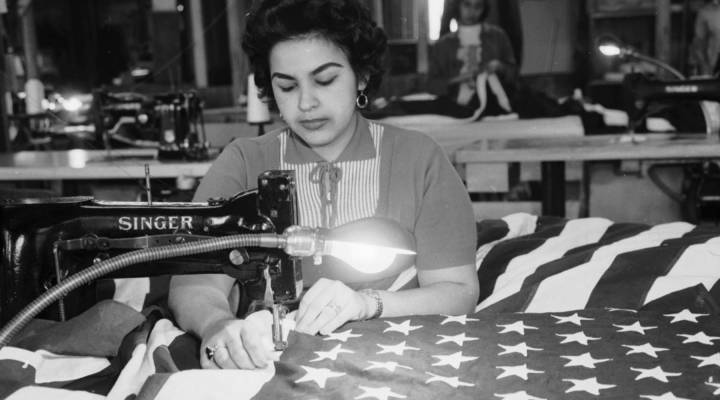
About half of Americans don’t really care who makes the things they buy
About half of Americans don’t really care who makes the things they buy

The president wants us to build American and consumers to buy American. Beyond that, there is a movement to get people interested in stuff produced ethically. But do people really want to know how the sausage (or the smartphone or the Madras shirt) was made? The product launch site called The Grommet decided to find out the answer to this by conducting a national survey.
Its founder and CEO, Jules Pieri, joined us to discuss the data her company collected. Below is an edited transcript.
David Brancaccio. Buy America, buy local, maybe avoid products from sleazy suppliers. You have a survey that says Americans don’t really care all that much?
Jules Pieri: Big sigh here, because there’s definitely a glass half empty side to the data. I think that the biggest number that might indicate that is 48 percent of Americans — we talked to 2,000 of them — feel like it’s easier to adopt an ignorance is bliss policy when making purchases.
Brancaccio: All right. So if you look at the 40 percent where maybe ignorance is more bliss, I mean, really, they don’t care if it’s made in a sweatshop in South Asia? They’re fine with that? They don’t want to give nice people who made something in Detroit a preference?
Pieri: Well, there is an interesting thing here. Sixty-four percent of them feel guilty about the various products they purchased, so I don’t think that they’re completely cavalierly, blindly not caring. But my own observation — because we’ve been launching products since 2008 — is that the awareness for the origin of your products is marching through different categories. And I would say food was something we could track easily in 2008 as an area of concern. Farmers markets have been growing annually 17 percent year-over -year since then. They’re a big thing and they’re inconvenient, right? So if you’re going to go out of your way to a farmers market, you care about food. Apparel is really what’s gotten the next biggest focus, as opposed to maybe electronics, which I think is probably an area that is kind of understated in terms of where people might not appreciate the conditions.
Brancaccio: So where am I leaving you, Jules? Are you encouraged by the about 50 percent that seem to care where their stuff is from and under what conditions it’s produced, or are you depressed about the still large percentage, just under half, who don’t seem to care that much?
Pieri: I’m an entrepreneur. My nature is to be optimistic and 52 percent of people caring is a massive market. That’s over 150 million people. So I think there’s plenty of room there for that segment to make change and to lead the rest of us.
| Trump keeps talking about trade, but he should be talking robots |
| What, exactly, does ‘Made in the USA’ mean? |
| Small-scale manufacturing is on the rise in American cities |
There’s a lot happening in the world. Through it all, Marketplace is here for you.
You rely on Marketplace to break down the world’s events and tell you how it affects you in a fact-based, approachable way. We rely on your financial support to keep making that possible.
Your donation today powers the independent journalism that you rely on. For just $5/month, you can help sustain Marketplace so we can keep reporting on the things that matter to you.












